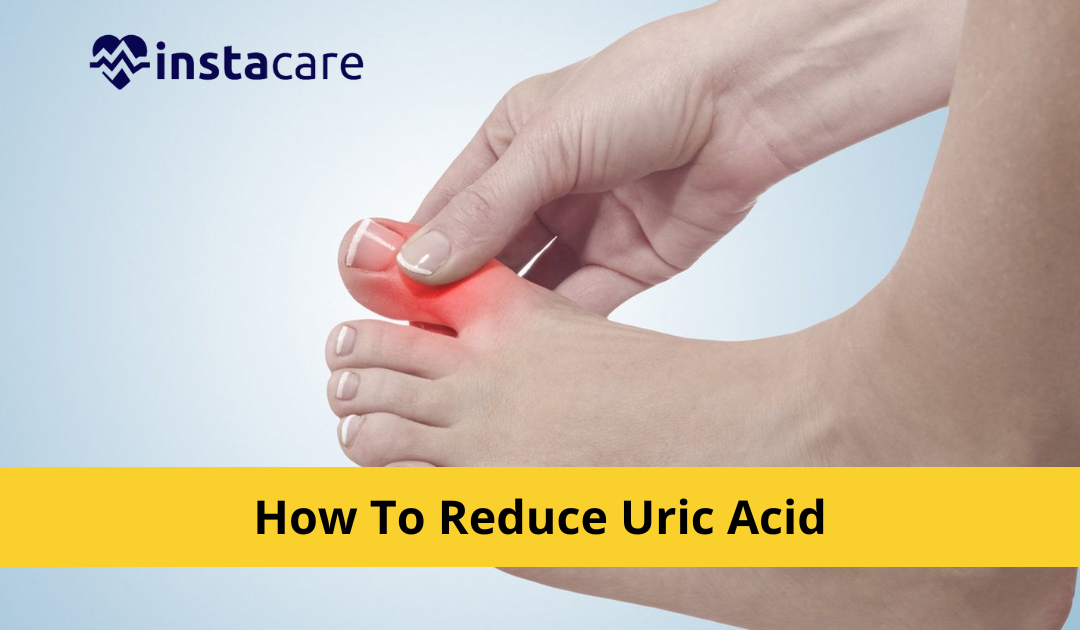Uric acid is a byproduct of the digestion of purine-containing meals. Purines are abundant in particular meals, including certain meats: sardines, dry beans, and bees. Purines are generated and broken down in your body as well. Uric acid is normally removed from the body through the kidneys and urine. Uric acid can accumulate in your blood if you ingest too much purine in your diet or if your body cannot eliminate this byproduct quickly enough. Hyperuricemia is a high uric acid level. This can result in gout, characterized by painful joints that collect urate crystals. It can also cause your blood and urine to become overly acidic.
Causes Of Reduce Uric Acid
Lower-than-normal uric acid levels might be caused by:
- Syndrome Fanconi
- Metabolic illnesses that run in families
- Infection with HIV
- Purine-reduced diet
- Atorvastatin, captopril, enalapril, fenofibrate, losartan, probenecid, and trimethoprim-sulfamethoxazole are examples of medications.
- Syndrome of inappropriate antidiuretic hormone secretion (SIADH)
Uric Acid Normal Range
The uric acid normal range is 3.5 to 7.2 milligrams per deciliter (mg/dL). Normal value ranges may change slightly between laboratories. Discuss the significance of your test findings with your clinician.
Uric Acid Symptoms
Hyperuricemia occurs when your blood has an abnormally high level of uric acid. High uric acid levels can cause various disorders, including gout, a severe form of arthritis. Elevated uric acid levels are also linked to health problems like heart disease, diabetes, and renal disease. Although hyperuricemia is not a disease, elevated uric acid levels can contribute to several disorders over time.
Gout: A sudden decline in uric acid levels might potentially cause gout. Gout can manifest as solitary attacks or flare-ups. Gout symptoms may include:
- a joint ache that is excruciating
- the rigidity of the joints
- Having difficulties moving the afflicted joints
- deformed joints with redness and swelling
Tophaceous Gout: Uric acid crystals can form tophi clusters after years of hyperuricemia. These hard lumps can be located under your skin, around your joints, and near the tip of your ear's curve. Tophi may aggravate joint discomfort and, over time, injure or constrict nerves. They are frequently apparent to the naked eye and can be disfiguring.
View More: How to Get Rid of Dark Circles?
Stones In The Kidney
Uric acid crystals can lead to the formation of kidney stones. The stones are usually tiny and pass through your urine. They can sometimes get too huge to pass and clog portions of your urinary system. Kidney stone symptoms include:
- lower back, side, abdominal, or groin discomfort or hurting
- nausea
- increased need to urinate urination
- discomfort when urinating, difficulties urinating
- You have blood in your urine.
Urine that stinks
You may have fever or chills if you also have a kidney infection. This urine accumulation is a great breeding ground for germs.
Food To Reduce Uric Acid
It is critical to have a well-balanced diet rich in vital nutrients such as crabs, proteins, good and healthy fatty acids, vitamins, and minerals. People with high uric acid levels in their blood find it challenging to choose the right and healthful items to include in their diet. As a result, a few nutritious dietary options can assist you in managing uric acid in the body.
- Green Tea contains a high catechin concentration, an antioxidant. Many people believe that catechin is utilized to slow down the synthesis of specific types of enzymes in the body.
- Fiber
- Vitamin C
- Water or fluids
- Berries
- Fruits and tomatoes
- Vegetables
Uric Acid Treatment At Home
Some natural therapies may be beneficial. However, if your gout pain is severe or sudden, see your doctor before using any of the therapies listed below.
- Purine-rich foods should be avoided. You may reduce the amount of uric acid in your diet.
- Reduce your stress
- Sugar should be avoided
- Foods high in sugar
- Stay away from alcohol
- Adjust insulin levels
- Reduce your weight
- Increase your fiber intake
- Examine your prescriptions and supplements
- Warm water with apple cider vinegar, lemon juice, and turmeric
Conclusion
There are several strategies for treating or avoiding gout episodes at home. The majority are natural and have few to no adverse effects. Before adding a supplement to your routine, consult your doctor first. Herbal supplements may cause interactions and negative effects.
Please book an appointment with the Best Rheumatologist in Lahore, Karachi, Islamabad, and all major cities of Pakistan through InstaCare, or call our helpline at 03100002273 to find the verified doctor for your disease.





